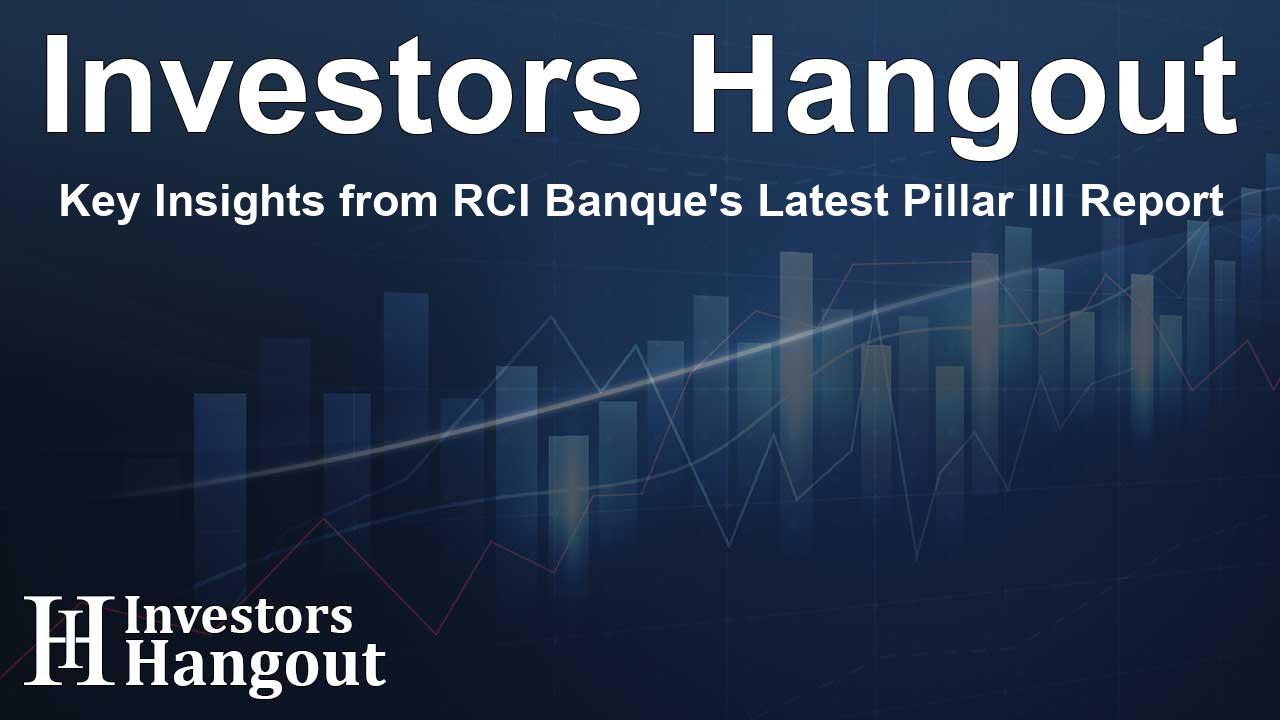Key Insights from RCI Banque's Latest Pillar III Report

Overview of RCI Banque's Pillar III Report
RCI Banque recently released its Pillar III report, providing valuable insights as of December 31, 2024. This report outlines essential data concerning the bank's capital structure, risk management, and financial stability, aiming to enhance transparency for stakeholders.
Importance of the Pillar III Report
The Pillar III report forms a critical component of the Basel Accords, functioning as a tool to ensure banks disclose relevant information about their capital adequacy and risk exposures. By adhering to these standards, RCI Banque demonstrates its commitment to ensuring a strong framework for risk management.
Key Highlights from the Report
In this year's report, RCI Banque elaborates on its capital ratios, which are pivotal for assessing the institution's financial health. The report indicates a robust capital position, showcasing how RCI Banque maintains a buffer above the minimum regulatory requirements. Key risk factors, including credit risk and operational risk, are assessed thoroughly.
Capital Adequacy Ratio
RCI Banque's capital adequacy ratio remains strong, which is instrumental in safeguarding the interests of depositors and investors alike. This ratio signifies the bank's ability to absorb potential losses while continuing operations without financial distress.
Risk Management Framework
A comprehensive risk management framework is in place at RCI Banque to tackle various risks encountered in banking operations. The institution employs various strategies to identify, evaluate, and manage both internal and external financial risks efficiently.
Future Directions for RCI Banque
Looking forward, RCI Banque aims to enhance its regulatory framework and improve reporting practices further. By continuously adapting to changes in regulations and market dynamics, RCI Banque remains committed to maintaining high standards of transparency and accountability.
Contact Information
For inquiries or further details about the report, interested parties may reach out through the official channels provided on the Mobilize Financial Services website.
Frequently Asked Questions
What is the significance of RCI Banque's Pillar III report?
The Pillar III report is crucial as it provides insights into the bank's capital structure and risk management practices, ensuring transparency with stakeholders.
How does the bank ensure capital adequacy?
RCI Banque maintains a robust capital adequacy ratio, which signifies its capability to withstand financial pressures and ensure stability.
What risks does RCI Banque acknowledge in its operations?
RCI Banque addresses various risks including credit, operational, and market risks, implementing strategies to manage these effectively.
How often is the Pillar III report published?
The report is typically published annually, providing a yearly snapshot of the bank's positioning and adherence to regulatory standards.
Where can I access the Pillar III report?
The report is available on Mobilize Financial Services' website, offering detailed insights and data related to RCI Banque's operations and financial health.
About The Author
Contact Caleb Price privately here. Or send an email with ATTN: Caleb Price as the subject to contact@investorshangout.com.
About Investors Hangout
Investors Hangout is a leading online stock forum for financial discussion and learning, offering a wide range of free tools and resources. It draws in traders of all levels, who exchange market knowledge, investigate trading tactics, and keep an eye on industry developments in real time. Featuring financial articles, stock message boards, quotes, charts, company profiles, and live news updates. Through cooperative learning and a wealth of informational resources, it helps users from novices creating their first portfolios to experts honing their techniques. Join Investors Hangout today: https://investorshangout.com/
The content of this article is based on factual, publicly available information and does not represent legal, financial, or investment advice. Investors Hangout does not offer financial advice, and the author is not a licensed financial advisor. Consult a qualified advisor before making any financial or investment decisions based on this article. This article should not be considered advice to purchase, sell, or hold any securities or other investments. If any of the material provided here is inaccurate, please contact us for corrections.
